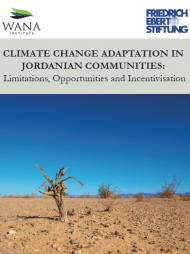-
Climate Change Adaptation in Jordanian Communities: ...
Climate Change Adaptation in Jordanian Communities: Limitations, Opportunities and Incentivisation
Jordan’s climate is changing. Average temperatures are increasing, while rainfall is declining. These trends are projected to worsen, and will not be limited to progressive changes such as heat and drought. Destabilisation of climate systems is expected to make sudden and extreme weather events more common. In Jordan’s case, this likely means an increase in flash flooding and unexpected frosts.
The implications scarcely need spelling out. According to United Nation Development Programme (UNDP) figures, Jordan is already one of the world’s 10 water poorest countries. It may even be the second poorest in the world, according to a 2014 announcement by the Jordanian Ministry for Water and Irrigation. Increased temperatures and worsening drought will affect Jordan’s food production and security, the availability of water for human consumption and industrial purposes, and the stability and sustainability of ecosystems. Impacts on areas such as energy production and national security are also plausible, although the causal chain is less direct.
This paper offers a detailed case study of the capacity of one rural Jordanian community to adapt to the immediate and projected impacts of climate change. It describes the measures that farmers have taken to adapt to worsening drought and heat, why these attempts have thus far been limited, and provides suggestions as to the kinds of policy changes needed to incentivise change. The information gleaned also provides important insights into cost-effective and time-efficient means of better understanding climate change challenges, vulnerability variations between communities and potential avenues for adaptation. Indeed, any exercise in adaptation will need to be locally-driven and align with local interests in order to be effective. The data collection tools employed in this research empowered community members to critically assess the changes taking place in their communities and reflect upon the impacts on their livelihoods. The tools thus represent a framework with strong upscale potential to be considered by policy-makers as the process begins to implement both the Sustainable Development Goals (2015) and the Paris Agreement (2016).
This publication was generously funded by Friedrich-Ebert-Stiftung.

